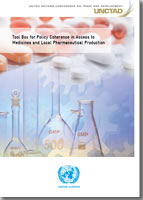
Under the 2008 World Health Assembly‘s Global Strategy and Plan of Action on Public Health, Innovation and Intellectual Property, UNCTAD was invited as a stakeholder to take action on the issue of transfer of technology in the pharmaceutical area and the local production of health products in developing countries.
In response, UNCTAD in cooperation with German International Cooperation (GIZ) is implementing, inter alia, a project on "Access to High Quality and Affordable Medicines in Africa and South-East Asia", which focuses on the need to provide coherence among domestic policies aimed at promoting local production of pharmaceutical products and access to medicines.
The present document is one of the outputs of this project. It seeks to provide interested governments with an overview of policy tools that may be considered to create a framework conducive for promoting local pharmaceutical production and access to medicines.
As the promotion of local pharmaceutical production depends on the coordination of various areas of policy, such as drug regulation, research and development, investment, trade and intellectual property, the Tool Box emphasizes the importance of ensuring coherence among policies that at first sight appear unrelated to each other.
It seeks to assist policy makers in understanding the cross cutting nature of promoting local production. The Tool Box provides a brief presentation of the most relevant policy tools in this regard.
The Tool Box does not attempt to resolve the question of desirability of local production as compared to the importation of medicines. It is addressed to those governments that have made the policy decision to promote local manufacturing and that wish to prepare a framework for sustainable production and, to the greatest possible extent, increased access to medicines.
The Tool Box is meant to contribute to the Sustainable Development Goals (SDG), in particular:
SDG 3; Ensure healthy lives and promote well-being for all at all ages by developing and providing essential medicines in accordance with the Doha Declaration on the Agreement on Trade-Related Aspects of Intellectual Property Rights (TRIPS) and Public Health.
SDG 9: Build resilient infrastructure, promote sustainable industrialization and foster innovation by supporting domestic technology development, research and innovation in developing countries.
SDG 17: Revitalize the global partnership for sustainable development, inter alia by enhancing policy coherence for sustainable development.



